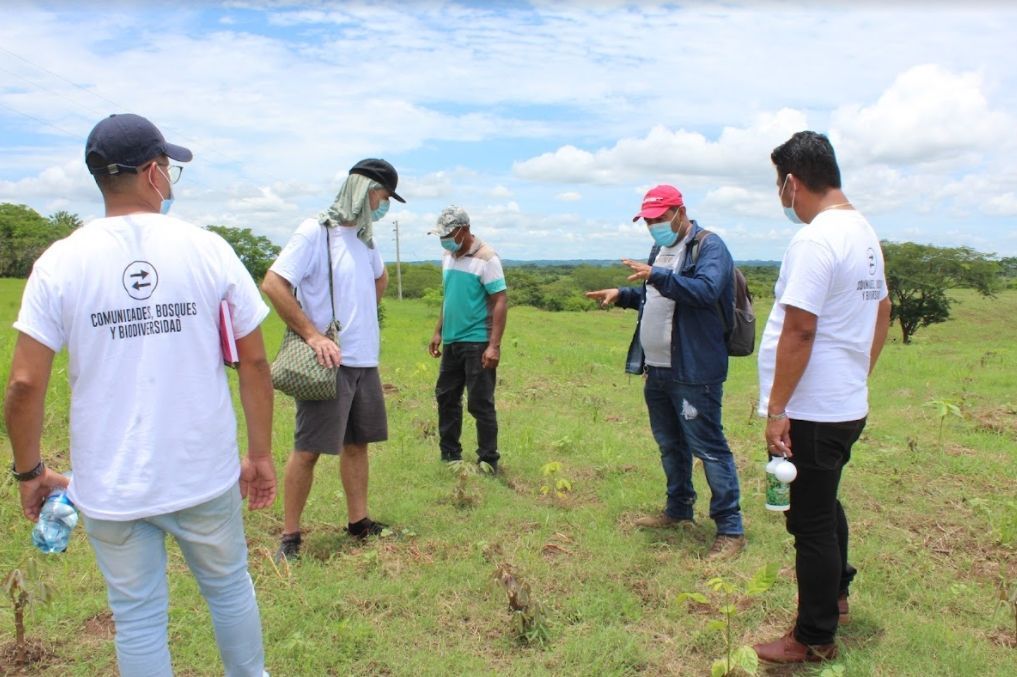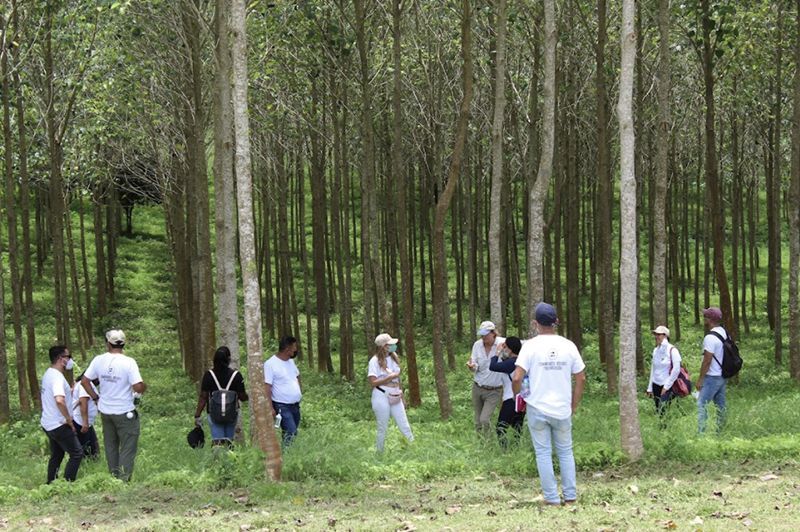The "Communities, Forests and Biodiversity" project led a learning exchange among communities to tackle climate change.
Bogotá, 9 September 2021. Leaders of indigenous and community-based organisations from Colombia, Guatemala, Honduras, Panama, Costa Rica and El Salvador, who are promoting actions for the integrated management of forests and their territories, met from 30 August to 4 September in Bogotá to exchange experiences on the application of REDD+ mechanisms (reducing emissions from deforestation and forest degradation; conservation, and integrated management of forests in developing countries); and on their experiences with reforestation for certification and the sale of carbon credits [1].
The project "Communities, Forests and Biodiversity: Promoting dialogue, exchange and forest value chains to adapt to and mitigate climate change", led by ICCO Cooperation, is developing actions in Colombia, El Salvador, Guatemala, and Honduras with the aim of providing tools to Community Based Organisations (CBOs) and Indigenous Peoples' Organisations (IPOs) to address climate change. Therefore, during the meeting a space was opened for dialogue and knowledge exchange on actions to reduce the effects of climate change and on integrated forest management.
 |
| Visit to the Commercial Reforestation and Carbon Programme in Magdalena Bajo Seco, Zapayan Municipality, Magdalena (Colombia). |
Success stories discussed included the development of agroforestry systems with farming communities and marketing of carbon credits by small and medium-sized landowners in El Salvador; environmental concessions and agroforestry enterprises marketing certified timber in the Petén reserve in Guatemala; and the development of forest management plans and business initiatives led by women in Honduras.
"It enriched us (the participants) because we were able to strengthen concepts on carbon markets and REDD+ programme strategies that are fundamental to continue strengthening governance in our territories, to continue protecting and continuing in this task that we indigenous peoples have been doing for many years, maintaining climate stability. We hope that together with Colombia and other countries we can increase joint actions that continue to promote forest conservation" said Cándido Mezúa, indigenous leader of the Emberá Wounaan community and participant in the event.
Cases of countries that apply REDD+ mechanisms and carbon credits
REDD+ mechanisms have proven to be one of the main avenues for climate change mitigation and adaptation, promoting the conservation of biodiversity, ecosystems and the generation of alternatives for communities to improve their socio-economic conditions. They help countries to value the carbon sequestration ecosystem services provided by their forests and create financial incentives to promote the reduction of deforestation. They also provide a framework through which countries, the private sector, multilateral funds and others can pay countries not to clear their forests; reforest or restore deforested or degraded areas.
Implementation is through direct payments for results or can be in exchange for "carbon certificates", which represent reductions in greenhouse gas emissions to offset emissions generated elsewhere.
Taking into account the REDD+ mechanism, ICCO Cooperation has developed in El Salvador a pilot model of reforestation with agroforestry systems for carbon sequestration and sale of certificates in the voluntary market, called INTERCHANGING CO2. This effort involves 200 producers who have managed to reforest 180 hectares of forest in municipalities surrounding the Cerrón Grande reservoir, a place of great ecosystemic importance because it is considered a RAMSAR site [2].
In Guatemala, the Association of Forest Communities of the Petén (ACOFOP) has managed forest concessions in the Maya Biosphere Reserve (MBR), and the communities are developing initiatives to generate income by protecting the forests. They have created forestry enterprises that process and market certified wood, xate palm, ramón seed, handicrafts, and promote community-based rural tourism. Through these initiatives, ACOFOP has managed to reduce the incidence of forest fires to 0%, it has also reduced deforestation to 0.4%, and has allowed 70% of the reserve's forest (MBR) to remain in good condition thanks to community management.
Colombia is one of the countries where forest conservation and reforestation initiatives have been promoted the most. In Alto Atrato, the Consejo Comunitario Mayor of the Organización Popular Campesina COCOMOPOCA, promotes the conservation of the Chocó's forests, developing agroforestry production alternatives, selling carbon certificates, and strengthening traditional governance. It promotes processes to take advantage of the products associated with the forest, such as the model for the community production of achiote (a plant used as a condiment), an item that allows income to be obtained from its collection and marketing, while ensuring forest conservation.
In Honduras, the Federation of Agroforestry Producers of Honduras (FEPROAH) and the organisation Muskitia Asla Takanka (MASTA) are involved in the implementation of the Communities, Forests and Biodiversity project, and have succeeded in developing forest management plans and forest-related business initiatives. For example, they have created nurseries managed by women and have strengthened community action through dialogue spaces for territorial governance.
These experiences allow us to ensure that the commitment of indigenous and community organisations is key to the conservation and restoration of ecosystems, climate mitigation and adaptation, in addition to the joint contribution of cooperation entities, local and national governments.
Information about the project
- The project "Communities, Forests and Biodiversity: Promoting dialogue, exchange and forest value chains for climate change adaptation and mitigation" is part of the Forests, Biodiversity and Ecosystems sector of the EUROCLIMA+ programme, implemented by EF and GIZ.
- Learn more about the project here.
About EUROCLIMA+
EUROCLIMA+ is a programme funded by the European Union and co-financed by the German Federal Government through the Federal Ministry for Economic Cooperation and Development (BMZ), as well as by the governments of France and Spain. Its objective is to reduce the impact of climate change and its effects in 18 Latin American and Caribbean countries by promoting climate change mitigation and adaptation, resilience and investment. The Programme is implemented under the synergistic work of seven agencies: the Spanish Agency for International Development Cooperation (AECID), the French Development Agency (AFD), the Economic Commission for Latin America and the Caribbean (ECLAC), Expertise France (EF), the International and Ibero-America Foundation for Administration and Public Policy (FIIAPP), the German Society for International Cooperation (GIZ), and the UN Environment Programme.
Contact for more information: This email address is being protected from spambots. You need JavaScript enabled to view it.
[1] Carbon certificates are an international mechanism to reduce polluting emissions in the environment; it is one of the three clean development mechanisms proposed in the Kyoto Protocol in 1997 for the reduction of Greenhouse Gases (GHG)..
[2] A Ramsar site is a wetland designated as internationally important under the convention of the same name.




